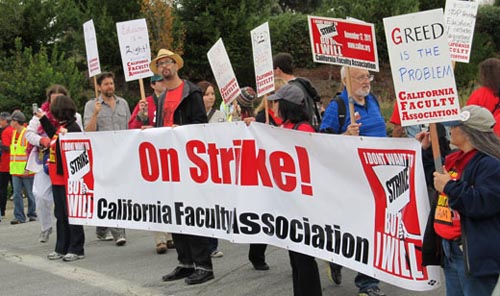
File photo courtesy Marilyn Bechtel/PW.
By Seth Sandronsky, via Media Workers Guild.
Editor’s Note: This article has been updated with a statement from CSU spokesperson Michael Uhlenkamp.
March 2, 2012
Union members in the 23-campus California State University system have scheduled a strike vote after 18 months of contract bargaining talks.
The Board of Directors of the California Faculty Association recently authorized an April vote to approve or reject a strike if no agreement is reached. The CFA represents 24,000 employees including coaches, counselors, librarians and professors in one of the state’s highest profile workforces.
The April CFA strike vote nears amid the wider backdrop of public protests against budget cuts affecting students from kindergarteners to post-graduate researchers. Protests are under way throughout the United States, and a group began marching on Thursday from the Bay Area to Sacramento under the Occupy Education banner. A labor-backed rally is planned Monday in Sacramento.
Face-to-face dialogue between rank-and-file membership about what is at stake for public higher education is key before the strike vote, said Kevin Wehr, CFA chapter president, bargaining team member and sociology professor at Sacramento State.
According to him, proposed CSU management takeaways compromise teaching and learning system-wide.
For example, CSU is pushing to move more classes and sometimes entire programs into its for-profit, Extended Education/Continuing Education arm, Wehr said. There, students pay higher prices compared with costs in the traditional non-profit semester system.
Further, CFA faculty will get lower pay in the CSU’s for-profit arm and have less control over workload. For instance, the CSU also proposes to remove caps on class sizes, with no limit on the number of students assigned to CFA faculty.
Packing more students into classes adversely affects them and faculty, Wehr said.
In addition, the CSU proposes to leave CFA members’ pay where it is for 2010-11 and 2011-12 and possibly re-opening benefits talks in the future. With the drumbeat of rhetoric against public workers’ pensions, a re-opening on benefits presents a real potential for CSU takeaways, according to Wehr.
Across the bargaining table from the CFA, C. Richard Barnes and Associates, LLC, represent the CSU. The firm’s lead negotiator collects $4,300 per day after a recent raise, said Wehr.
“That should surprise nobody as to why we have been in negotiations for 18 moths with nothing to show for it,” he said. The CFA’s contract expired June 30, 2010.
Organizing of faculty via daily communication about the strike, should, according to Wehr, result in a successful vote (a majority of 50 percent plus one). He expects a strong turnout at the 23 campuses, with union members voting from April 16 to April 27.
CSU spokesperson Michael Uhlenkamp sent a statement by email when asked to comment on the union’s allegations of foot-dragging: “The CSU continues to engage in good faith bargaining with CFA. We are at a stage where negotiations are dependent on the process with a state mediator and his availability and the duration is typical for successor negotiations. We have accepted all of CFA’s proposed meeting dates, including two upcoming dates this month, and we will continue to come to the table prepared in hopes of reaching an agreement.”
The results will be announced at the end of April.
“It’s possible that a strong strike vote could persuade CSU Chancellor Charles Reed to come to his senses,” Wehr said.
Recall CFA’s rank-and-file voted for a one-day labor action at CSU East Bay and CSU Dominguez Hills last November 17. CSU management did not budge in contract talks after that one-day strike, Wehr said.
In a CFA fact sheet then, the union said over the past 13 years in inflation-adjusted dollars, CSU campus presidents’ average weekly salaries climbed 23 percent. Meanwhile average student fees and tuition soared 106 percent, as the average weekly salary for full-time CSU faculty dropped 10 percent from 1998 to 2008, the last year that they received raises.
“Our motto is, ‘We don’t want to strike for a fair contract but we will because there is no other choice to maintain the quality of public higher education in California,’” Wehr said.


 The Hunger Site
The Hunger Site
No Comments
Comments for CSU Faculty Union Calls Strike Vote After Contract Talks Stall are now closed.